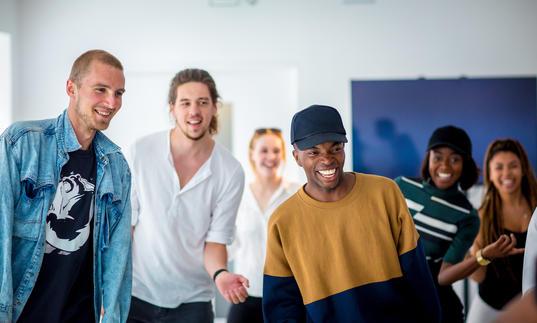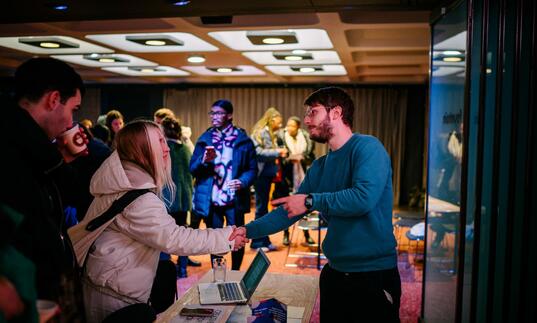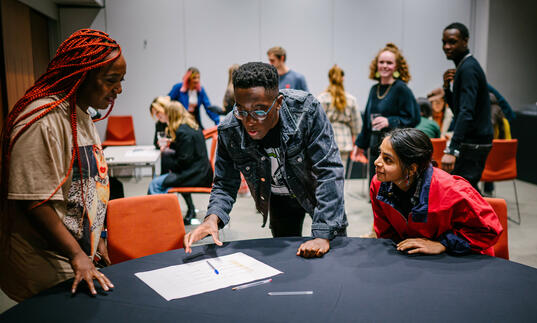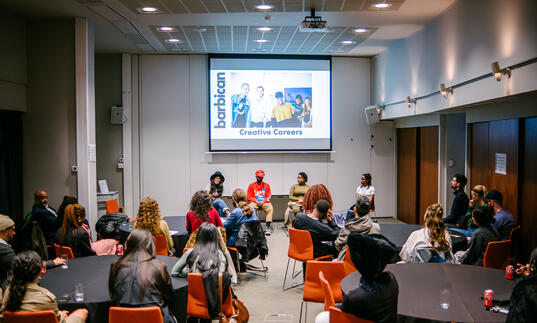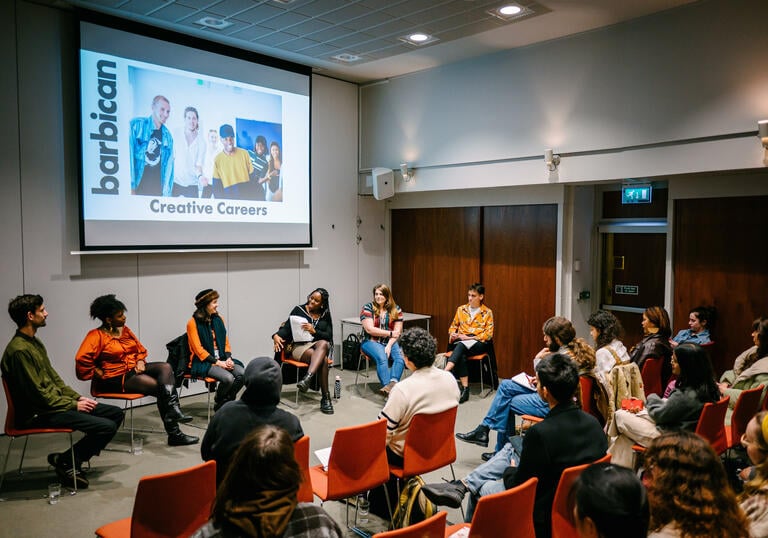
Session Recap
The room buzzed with anticipation as Gabriele, our host, turned to the audience and posed a thought-provoking question, "Why are you here today?" The air filled with a collective sense of curiosity and uncertainty as attendees shared their reasons. The resounding theme emerged: they were all on a quest to explore the vast realm of creative careers, seeking inspiration and guidance.
Among the participants, one individual bravely stepped forward to share their personal journey. Working full-time in the hospitality industry, they found themselves trapped in an "awkward black hole," juggling bills and yearning to break into a creative field. The room fell silent, captivated by their story. Nods of empathy rippled through the crowd, as everyone could relate to the frustration and confusion expressed by Meg, who exclaimed, "I'm like ahh, I have absolutely no idea what to do!"
As each person unveiled their motivations, we caught glimpses of their grandest dreams, but also witnessed the daunting fears and challenges that loomed before them. It was a raw and honest display of vulnerability, forging an instant connection among the attendees.
Then, Lauren took the stage, casting a spotlight on the Barbican and its four enchanting art form areas: Music, Cinema, Theatre and Dance, and Visual Art. With a new CEO and Artistic Director leading the way, she explained that the Barbican was undergoing a transformative phase, reimagining its purpose. This refreshing transition also heralded the birth of a Creative Collaboration department, a beacon of possibilities and innovation.
The atmosphere crackled with excitement as the institution's mystique unravelled through genuine conversations. The Barbican, once an enigmatic entity, was now laid bare, humanized through open dialogue. Inspired and empowered, attendees feverishly etched ideas into notebooks and tapped away on their phones, eager to capture every valuable insight.
In that room, dreams met reality, fears found solace, and knowledge became power. It was a transformative experience, uniting aspiring creatives and unleashing a surge of energy that would propel them forward. The Barbican had not only offered a glimpse into its inner workings but had also sparked a fire within each individual, igniting a sense of purpose and possibility.
As the event concluded, the echoes of their shared stories lingered, fostering a newfound sense of community and determination. The creative industry awaited these bright souls, and armed with newfound knowledge and inspiration, they embarked on their unique paths, ready to conquer the world of creativity.
Creative Careers Self-Help Guide
Finding Inspiration
- Don’t overwhelm yourself; just find ways to inject small bits of creativity into your day.
- Find and build organic groups - not necessarily courses. Leytonstone, for example, has a massive community around cinema.
- Jobs outside of the creative field can still give you transferrable skills. “They lap up people who’ve worked in hospitality for runners in film and TV, which can get you in the door.” - Faith
- “By being here, you're already doing the right thing.” - Joe
- The City of London run various apprenticeships, which could be a potential avenue for finding your way into the creative industries.
- Lauren shares some personal advice, telling the audience that they will be working for a long time and that there will be crossroads. She says “It’s ok to step away. You can always leave the arts and return later. It’s not like you will leave and never be able to come back.”
Building Networks
- The power of a network has been an ongoing theme at Creative Careers.
- “It’s about relationship-building. Be proactive about connecting afterwards.”
- A human approach to work has always worked better than traditional application routes.
Finding Joy
- Faith advocates for following interests, “I’ve stuck my fingers in a lot of pies… things almost happened by accident because I spent more time doing what I wanted and what I enjoyed.”
- On freelancing and its unique challenges, Joe says, “You’ve got to find it exciting, first and foremost” and “Be interested. Demand more knowledge of what things are happening and why.”
- Ask lots of questions about the job to fully understand its scope.
- Saying no won’t be the end of your relationship with that person/company/institution. Being able to say no is a skill. It’s a skill you need to know so practise it.
- Spend time on internal work and ask, “Who do I want to be in the space? What do I want to contribute?”
Navigating Institutions
- Institutions are a lot to get to grips with. And there are a lot of moving parts. Fikayo recommends taking part in programmes like the Barbican Young Visual Artist Group to try activities within a safe space before entering high-pressure environments. “It’s one of the best things I did to introduce me to the industry as a whole.”
- Talk to someone that you know if you can, busy departments aren’t very open to unsolicited messages.
- “As someone that’s never got a job that they’ve applied for (ever) it’s about going between the lines. Making yourself known. Push that proactive side.” - Joe
- Applications will be met with hundreds of ‘Unfortunately, not this time’ emails and these are the stories that you don’t hear. See them as opportunities, not failures. And build resilience to rejection.
Developing Networks
- Don’t view people as above you or below you as defined by their job title - but see people as people.
- Find safety in common values and consider why people have made it to certain positions - “If I’m putting myself out there, I need to feel some degree of safety so that it’s positive and genuine for me.”
- Insecurity, fear or imposter syndrome will hold you back, you need to work on ways to circumvent that.
- Faith keeps a sheet of contacts to call upon people when she needs to and can suggest people when her network need support too. She says, “be passionate and be good” and you’ll be asked back or suggested for work in the future."
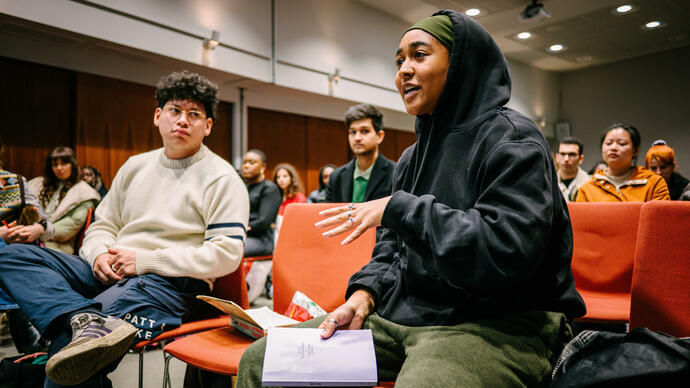
Creative Careers: What the Barbican Can Offer You?
Creative Careers: What the Barbican Can Offer You? audience.
Photography by Matthew Kaltenborn.
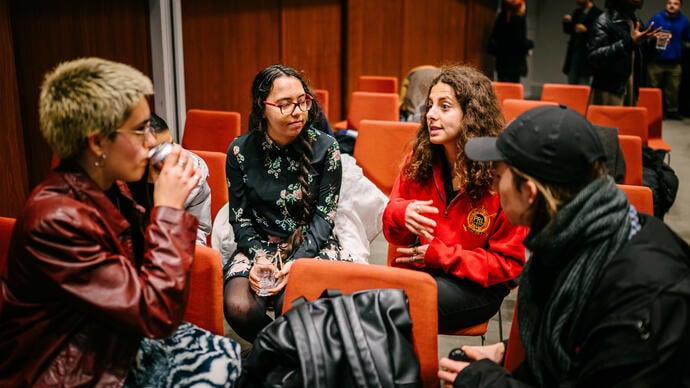
Creative Careers: What the Barbican Can Offer You?
Four participants from the session networking.
Photography by Matthew Kaltenborn.
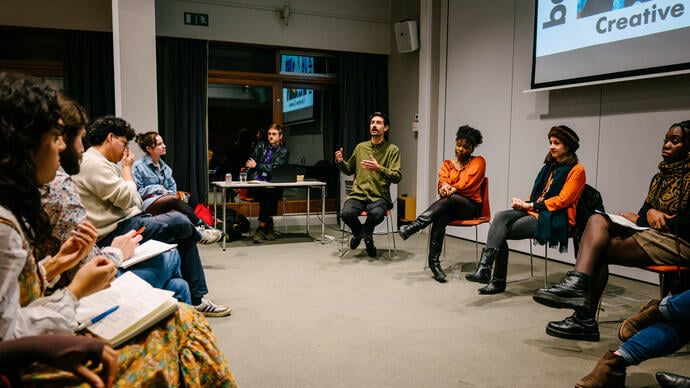
Creative Careers: What the Barbican Can Offer You?
Panellists (left to right) Joe Gray, Fikayo Adebajo, Lauren Monaghan-Pisano and Mercy Welbeck.
Photography by Matthew Kaltenborn.
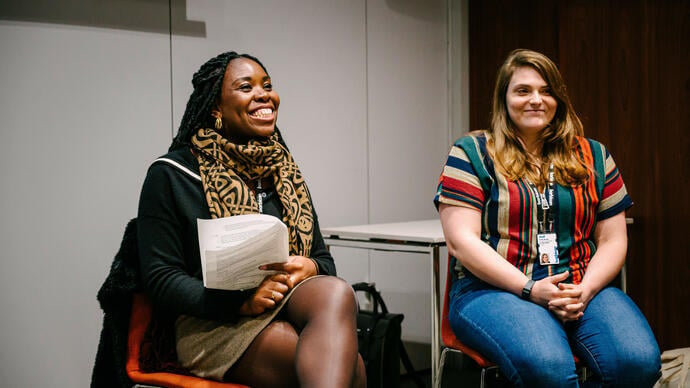
Creative Careers: What the Barbican Can Offer You?
Panellists Mercy Welbeck (left) and Faith Austin (right).
Photography by Matthew Kaltenborn.
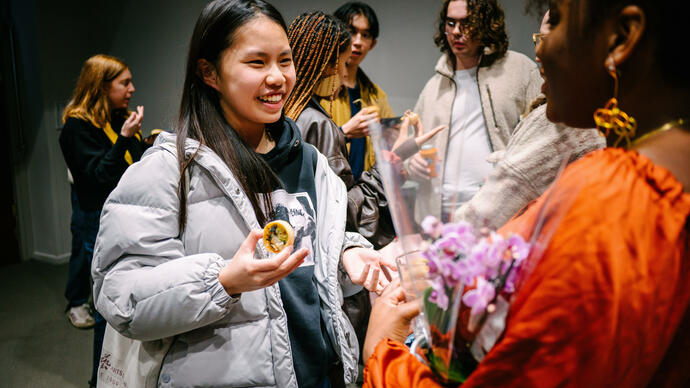
Creative Careers: What the Barbican Can Offer You?
Panellist Fikayo Adebajo networking with audience.
Photography by Matthew Kaltenborn.
